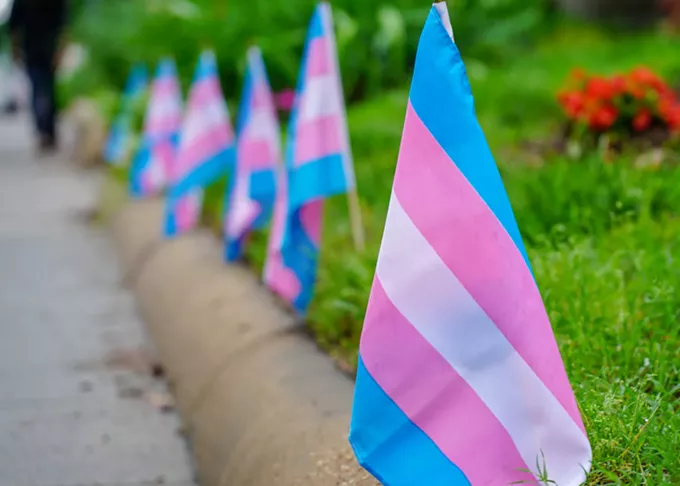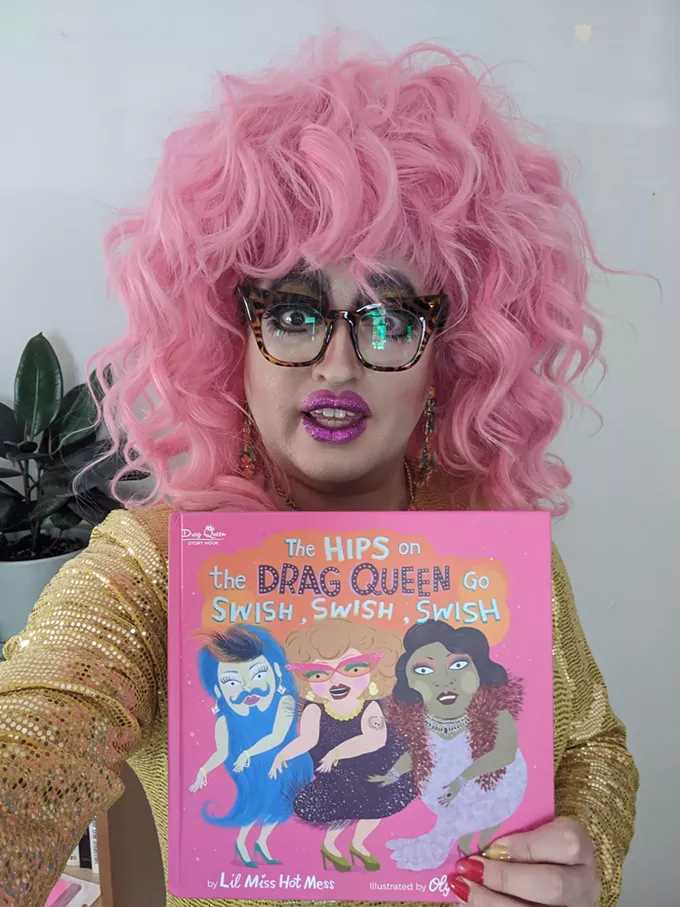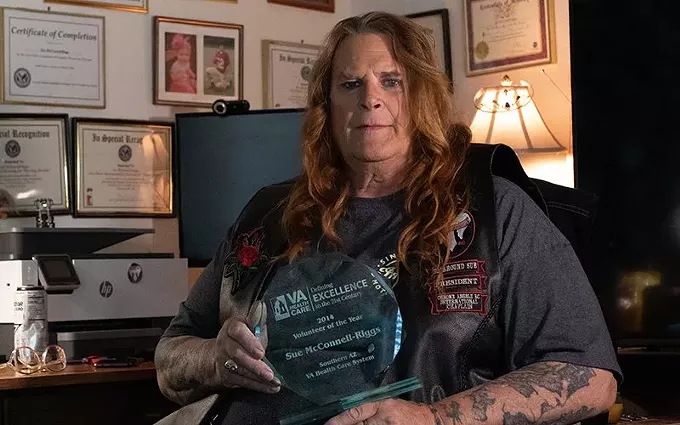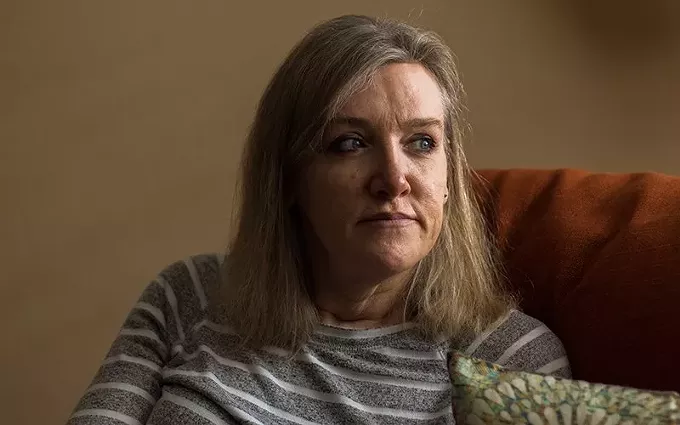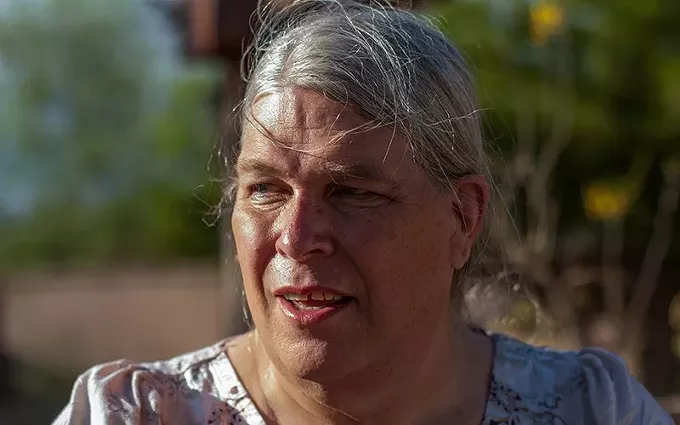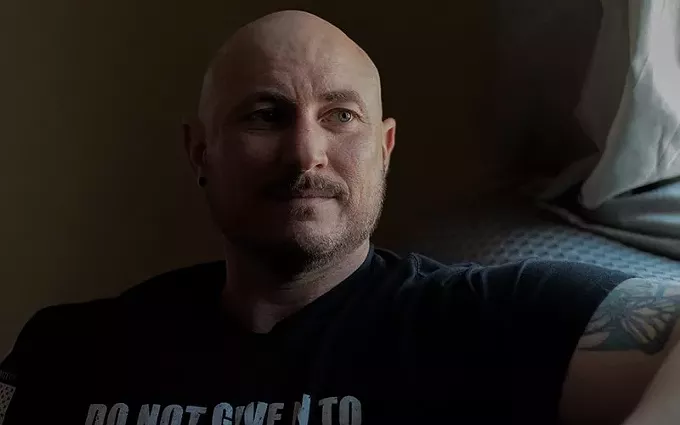Thursday, March 31, 2022
In a move against transgender youth in Arizona, Gov. Doug Ducey signed new laws barring them from participating in girls’ and womens’ sports, and from obtaining gender reassignment surgery.
Senate Bill 1138 prohibits doctors from providing genital reassignment surgery to minors, including mastectomies or mammoplasties to feminize and masculinize a patient’s chest to be more in line with their gender identity. Senate Bill 1165 requires all interscholastic sports to narrowly define gender, effectively denying trans student-athletes the ability to play on the teams most consistent with their gender identity from elementary all the way to university.
“This legislation is common-sense and narrowly-targeted to address these two specific issues — while ensuring that transgender individuals continue to recieve the same dignity, respect and kindness as every individual in our society,” he wrote.
Trans advocates have noted that enacting anti-trans legislation negatively affects the mental well-being of trans children, and may contribute to increased suicide risk. A recent poll from The Trevor Project, a suicide prevention organization for LGBTQ youth, found that as much as 85% of surveyed transgender and nonbinary youth felt debates around anti-trans bills negatively impacted their mental health.
Ducey responded to a question from the Arizona Mirror about this effect by saying that the bill’s intent was to protect girls’ sports.
“(SB1165) was positioned and framed to protect girls’ sports, female sports, and Title IX. And of course, on the subject of mental health with our children, this is something we all have great concern for and great empathy for…I think that Arizona has handled this in the most responsible way possible to keep a level playing field out there for young female athletes and to address the other issues,” he said.
Sponsors of SB1138 have touted it as a reiteration of international standards of care for transgender kids. But opponents say those standards are due to change this year, and codifying old standards can present doctors with a contradiction between following the law and providing best medical care practices for their patients.
“We’re going to be putting doctors in a situation where they’re codifying standards from 10 years ago, and we’re going to put them in a situation where they’re now at odds with new standards,” said Rep. Melody Hernandez, D-Tempe, who is also a paramedic, during a House debate of the bill on March 24.
Proponents of enacting barriers to girls’ sports argue that trans youth have an unfair biological advantage. But the Arizona Interscholastics Sports Medicine Advisory Committee says that’s not a problem that needs solving in the state. Out of the roughly 170,000 students the committee oversees in high schools across the state, it has fielded only 16 appeals from transgender youth since 2017. When reporters pointed this out to Ducey during a brief media availability Wednesday, he deflected, reiterating the bill’s intent.
“We’re going to protect girls’ sports. It’s an issue of fairness,” he said.
Critics say the law pushes Arizona backwards. Just two years ago, a 1991 law banning schools from promoting a “homosexual lifestyle” was repealed, and Kathy Hoffman, Superintendent of Public Instruction in Arizona, tweeted that the new legislation will be equally difficult to deal with later.
“We repealed ‘no-promo homo’ three years ago, a bigoted law that took decades to overturn. Today, (Ducey) sided with extremism, injected politics into our schools, and signed similarly hateful bills,” she wrote.
Last week, similar legislation in Indiana and Utah was vetoed by governors in those states.
The Human Rights Campaign condemned Ducey’s action in comparison to this, saying the move only contributes to nationwide attacks on trans kids. This year saw a record number of anti-trans legislative proposals, with as many as 280 — a spike from last year’s 147 bills.
“Gov. Ducey has chosen discrimination over protecting the well-being of vulnerable children. This isn’t leadership, it’s cowardice,” said Director Cathryn Oakley in an emailed statement.
Thursday, January 27, 2022
Arizona Republicans this week lined up behind a measure that would discipline teachers and open them up to lawsuits if they don’t tell parents everything a student tells them — even if the student confides that he or she is gay or transgender.
The legislation, House Bill 2161, would make it illegal for a government employee to withhold information that is “relevant to the physical, emotional or mental health of the parent’s child,” and specifically prevents teachers from withholding information about a student’s “purported gender identity” or a request to transition to a gender other than the “student’s biological sex.”
The bill would allow parents to sue school districts if teachers don’t comply.
Rep. Steve Kaiser, R-Phoenix, the bill’s sponsor, argued in the House Education Committee on Jan. 25 that the aim of the legislation is to reign in surveys sent out by schools that have made headlines in a number of states and locally. The bill also aims to allow parents additional access to certain medical records.
“I still feel this bill is not ready for prime time,” Rep. Daniel Hernandez, D-Tucson, said, adding that he felt there was some merit to schools surveying students. “This bill could’ve been done without this inclusion or without the trivialization of transgender children.”
Monday, October 25, 2021
Lil Miss Hot Mess will present her research on drag studies at the University of Arizona Poetry Center, 1508 E. Helen St., in the Dorothy Rubel Room at 7 pm on Tuesday, Oct 26.
Lil Miss Hot Mess is a well-known drag queen, activist, scholar, children’s book writer and storyteller of Drag Queen Story Hour, a program that brings drag queens and children together for storytime. Her children’s books include The Hips on the Drag Queen Go Swish, Swish, Swish. (The forthcoming If You’re a Drag Queen and You Know It will be available in May.) Lil Miss Hot Mess is a professor at UA who teaches history and theory of play. Lil Miss Hot Mess’s presentation is part of UA’s 2021 Tucson Humanities Festival and will be available for live stream at humanitiesfestival.arizona.edu/live.
What can attendees expect to see at the presentation?
It’s an overview of my work with Drag Queen Story Hour and some research that I've done on drag pedagogy. In addition to being a drag performer, I am also a professor at the U of A. Some of my research is about what can we learn from Drag Queen Story Hour in the broadest possible sense. Not just, how do we think about LGBT or gender 101? But, how we can learn to be better teachers or educators if we adapt some of the strategies of drag performers. I talk about things like how to incorporate humor to de-stigmatize difficult topics.
What topics are you destigmatizing?
When I talk about drag I like to actually highlight that it's not just about gender, it's not just about a physical transformation because drag has many different forms. Drag is about exaggeration. It's about turning your fantasy into a reality and often it's about dealing with difficult topics through a sense of camp, through a sense of humor. Being willing to laugh at ourselves and laugh at the world, but also take some of these things seriously. For example with Drag Queen Story Hour, we like to read books that address different topics of diversity, bullying, of finding your own creative voice. But, we also like to read the classic Everyone Poops. Which is a way of taking a thing that can be serious, scary, or shameful for kids and reading the book together and laughing at it. I also think it is for kids who might be questioning their identity, their gender identity or feel different because they are multiracial, adopted or have a disability. They learn about finding strength through humor and leaning into those things that make us different is part of what drag culture is all about.
What inspired you to do this type of research?
I fell into Drag Queen Story Hour through some of my friends in the San Francisco Bay Area. It started in 2015. I was living in New York at the time, and we brought it to New York. You know, it's blossomed all around the country and all around the world. I think there are so many affinities between drag performers and children. Drag is literally dressing up and playing. Kids are all about imagination. They're all about play, they're all about asking a lot of questions and I think that's another thing drag does well is that it questions authority, it questions history. It asks why? Why should we do something one way because it has always been done that way? Being able to explore that with kids not only provides them an important educational opportunity but I've also learned a lot in so many different ways from working with children in drag. The research came after doing the events because I wanted to go a little bit deeper.
It's like a commentary on education and how we can approach talking about these deeper topics with kids.
Much of education is test scores and memorizing. Even important work in diversity or social justice topics still tends to be framed as learning the vocabulary for LGBTQ or learning how to get some of these things right. I think that drag opens up a little bit more space for improvisation, for experimentation, for taking risks, for being willing to fail together and laugh at off or learn from it. I think that is actually a major shift from the way that we think of education in this country.
What are you hoping people walk away with from your event?
My main goal throughout all of this work is to get people to loosen up a little bit and enjoy that sense of play and be open to thinking about things in a different way. I will talk about five specific strategies that people can use but again, I don't want people walking away with notes. I want people to walk away feeling that we can activate our imaginations to do things differently. How do we tap into our own creativity? How do we use that to reimagine our world?
I think drag can intersect with a lot of different aspects of our lives. One thing that I try to make clear is that when I talk about drag pedagogy or drag education, I'm not suggesting that every teacher put on a wig or a pair of heels. But that people think about some of these elements to transforming something about the way you work, or bringing out an aspect of your personality that you don't always allow to shine can change the way that you relate to people or relate to different situations. So it's not about becoming a drag but it’s really about learning a little bit from us.
Tags: Tucson Humanities Festival , drag , drag queen , Lil Miss Hot Mess , University of Arizona , UA , humanities , storytelling , children's books , Image
Tuesday, August 24, 2021
Tuesday, August 10, 2021
"Time-traveling lesbians." That was all the pitch Tierney Harris needed when their friend Will Holst asked if they wanted to participate in a short film, Mind Over Time. It tells the story of Dawn, a young woman who has been haunted for years by a mistake she is desperate to undo. But also, yeah, lesbian time travel. The film premieres at the Phoenix Film Festival on Aug. 14 and will also be shown at OUTFEST Los Angeles on Aug. 20.
Holst is a sci-fi fan, but it was important to him to tell a story where the main characters didn’t all look like him, a white man. He wanted the story to display some of the diversity he knows and loves among his loved ones. For example, the character who proposes the theory for how to time travel is a young black professor. And the story centers around an interracial lesbian relationship.
“I thought it was really awesome to make it a very obviously LGBTQ story, because you do see a lot of, ‘Oh, here’s the story line and it happens to be gay.’ But definitely while I was on set I was like, ‘I’m gonna make this so gay, on purpose,” says Harris, who plays Dawn’s partner, Grace. “I’m bisexual, and I loved an opportunity to really express myself on film like that. It was the first project that I’ve ever been on where I get to show that side of myself.”
Many of the cast and crewmembers are University of Arizona alumni, and all are, or were, affiliated with the university in some way. The group’s familiarity with the city came through in the film: The main characters hike through the Tucson desert, sip coffee at Espresso Art over on University Boulevard, walk across Rattlesnake Bridge over Broadway Boulevard, and even take shelter from a sudden downpour, like all Tucsonans have had to do. In some ways, it serves like a love letter to Tucson as much as it is a love story between two people.
“I was really excited abut making something in Tucson with people that I know and love,” says Isa Ramos, who played Dawn. “It was really cool to add a little magic to places that have formed me.”
While COVID stalled or even annihilated many people’s creative endeavors, Holst said it acted as a catalyst for the movie project.
“We’d always talk about movies or come up with cool ideas and they never come to fruition,” he says. “And this time it was l just like, ‘Well, we should do it,’ because you never know what the future holds. You really have to take every opportunity you can to be creative or do something you love or are passionate about.”
It’s hard to imagine a better year to make a movie about time travel than the year where time felt completely out of whack. Some months in 2020 seemed to drag on for months, while others felt like they lasted seconds. This collectively warped sense of time set the scene well. People’s schedules were different. People’s priorities were different. People’s creative processes were different. But in between other jobs, and in early mornings and late into the night, the 13-member team made it happen. They shared a COVID bubble and worked as safely as they could – the most people on set at any given time was six, and many crew members did their post-production work remotely. Holst said everyone on the crew had a handful of jobs within the project.
“It was something I’d never done before, and it was the middle of 2020, so what else were we doing?” said Dani Danec, who did the show’s makeup and hair (and was second AD, and kept track of the schedule, and was a stunt driver, and did audio work, etc…) She added that, besides being able to make it to filming when she was also working another job, one of the biggest challenges was shooting a film in the heat of summer that takes place in November. “How do we make you look like you’re bundled up without actively killing you?”
Holst said he calculated the budget as approximately $7,000 – which includes both the cost of equipment he already owned, rented pieces and equipment he bought as part of the universally self-prescribed retail therapy movement of 2020.
The team was thrilled when the film was accepted to Phoenix Film Festival, the largest film festival in Arizona, as well as to OUTFEST Los Angeles, one of the largest LGBTQ+ film festivals in the world.
See Mind Over Time at the Arizona Shorts A Program at the Phoenix Film Festival, at 4:50 p.m. on Saturday, Aug. 14. Or see it in the OUTFEST Los Angeles’ What a Girl Wants shorts program at 7 p.m. on Friday, Aug. 20. For more information, visit MindOverTimeFilm.com.
Thursday, August 5, 2021
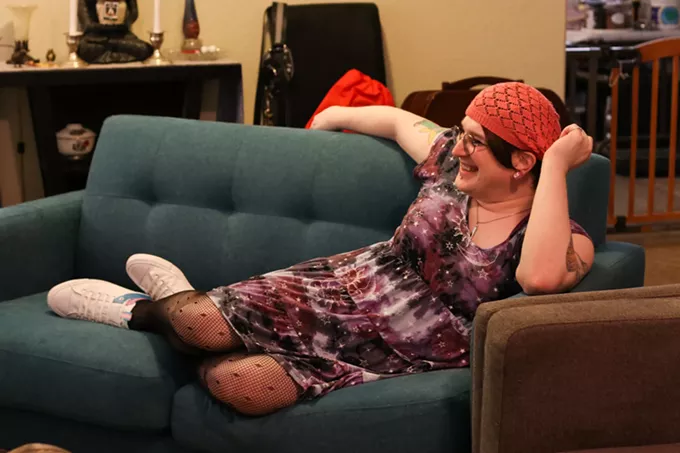
PHOENIX – In the Zoom window, Odele Pax looks small, contained. Her boisterous laugh and candor belie her many mentions of how nervous she is. Pax holds back tears as she talks about her journey toward gender affirmation.
“There are no words to describe how liberating it feels, you know, that, finally, I not only know who I am, but I get to turn to the world and say, ‘Look … this has always been who I am,’ ” Pax said.
Pax, originally from New York City and now living in Queen Creek, is referring to the process of legally changing her name to match her trans femme label. She’s one of more than 100 people who reached out to Daniel Riley, a family attorney with Curry, Pearson and Wooten, on his offer to do pro bono gender-confirming name changes for trans and nonbinary people in honor of Pride month in June.
Riley said the need is great in the LGBTQ+ community for name changes, and he hopes to make it a bigger project. He’s not taking new clients at present.
“It would definitely be a more systematic approach next year, now that we know the kind of response we’re going to see,” he said.
Riley, who has practiced in metro Phoenix for 11 years, said he made his offer because name changes are easy for lawyers and life-changing for clients.
Friday, June 4, 2021
Tuesday, June 1, 2021
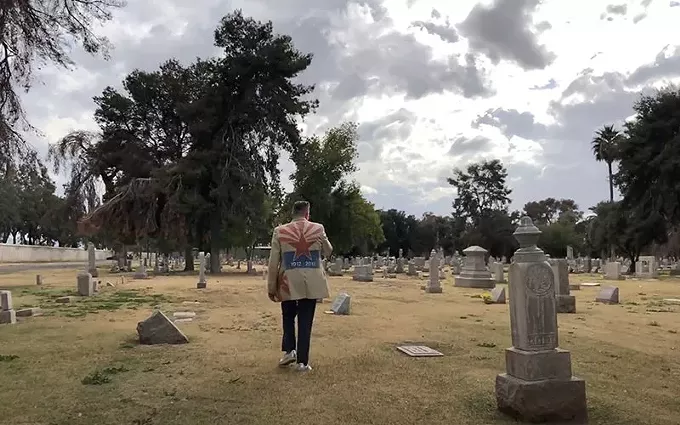
PHOENIX – Arizona’s Hip Historian Marshall Shore is known for his vivid storytelling, a cult-like following and expertise on the state’s history.
From his regular Arizona History Happy Hour to his ghost tours of the Valley, Shore has become a local celebrity. Part of the appeal is his study of under-represented groups and his interest in rewriting history with equity in mind.
Through the support of his followers, Shore was able to raise funds to purchase a headstone for a transgender man who was buried without one in the early 1900s.
The Greenwood Memory Lawn Mortuary & Cemetery in Phoenix opened in 1906 and holds the remains of some of the people who defined Arizona, including John T. Alsap, Phoenix’s first mayor, and William S. Hancock, who laid out the Phoenix townsite, according to the Arizona Republic. It also has been the site of controversy, including a movement to remove a Confederate veterans memorial.
“You can tell a lot about a city by going and visiting a cemetery and seeing its history,” Shore said.
To Shore, each stone in Greenwood cemetery represents a life with a story to share – but in the case of Nicolai De Raylan, the absence of a headstone was much more significant.
“It’s a really amazing story,” he said.
Shore learned about De Raylan in 2016 and said he was curious to learn about the secret life of a “gender pioneer” who died in Arizona in 1906.
Nicolai de Raylan emigrated from Russia to pursue a government job in Chicago. There, he married his first wife. Shore said De Raylan quickly got divorced, reportedly because he was “a little amorous with chorus girls.”
Shortly after, De Raylan married his second wife, Anna Davidson, and became a stepfather to her 10-year-old son.
In 1906, De Raylan was diagnosed with tuberculosis, and he visited Arizona to receive treatment. At the time, Arizona was known for its clean air.
“It didn’t go so well for him, he wound up passing away a few months later,” Shore said.
De Raylan left behind mounds of wealth and his beloved wife.
Tuesday, May 11, 2021
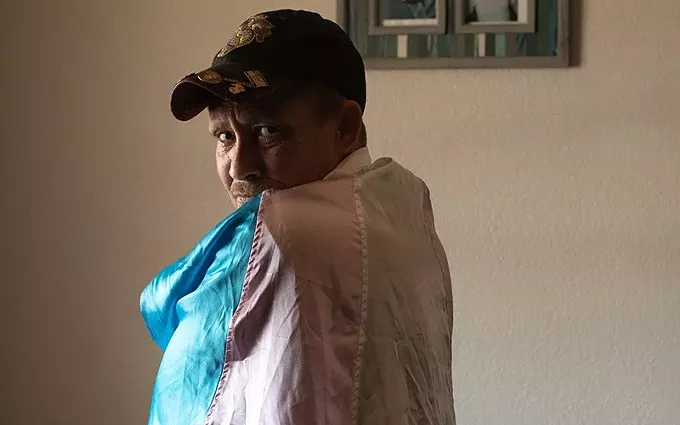
PHOENIX – The status of transgender members of the armed forces has shifted dramatically in the past decade as President Joe Biden and his two predecessors issued conflicting orders defining and redefining the eligibility of transgender Americans to serve their country.
Five days after taking office in January, Biden signed an order to reinstate transgender servicemembers, reversing Donald Trump’s 2019 order, which effectively banned transgender individuals from service. It was just one of a number of Biden reversals of Trump-era rules, the most recent coming Monday when the Department of Health and Human Services said it would again include gender identity as protected by anti-discrimination laws when it comes to delivery of health care.
The Trump administration’s order on military service was a reversal that would have blocked enlistment and expelled service members who have been diagnosed with gender dysphoria and any transgender medical procedures, such as hormones.
According to Palm Center, an independent research institute, Trump’s ban was similar to the “Don’t ask, don’t tell” policy President Bill Clinton put into place in 1994 to address gays and lesbians in the armed forces. The Obama administration repealed “Don’t ask, don’t tell” in 2011, allowing “gay and lesbian” individuals to serve openly.
Although Trump enforced a ban that was not as explicit as “Don’t ask, don’t tell,” it was set up in a way to weed out those in the military who don’t identify with their gender assigned at birth.
According to the Williams Institute at the UCLA School of Law, about 15,500 people in the U.S. military, reserves or National Guard openly identify as transgender, and about 134,000 veterans identify as transgender.
Cronkite News spoke to five transgender veterans in Arizona to gain perspective on what it meant to serve in the military and witness the shifts in how their identities are viewed by the commander in chief. Some reported loss of status and military benefits because of their sexuality, and others reported traumatic experiences while in service, including sexual assault.
Blue Montana of Phoenix
“I woke up and looked at my Facebook. And I said, ‘Oh, good. You know, I don’t matter anymore.’”
When news broke that the Trump administration would ban transgender Americans from the military, Blue Montana’s immediate concern was for his transgender friends who were still in the military.
“Some of them were officers, they’ve (had a) 10-, 15-, 20-year career. Are they going to get kicked out? Are they going to get court-martialed? Like, what’s going to happen?”
As a transgender man, Montana still is denied benefits and medical access that veterans rely on for treatment of injuries and mental health issues. Before he transitioned, he served in the Marine Corps for more than a decade until he was outed.
It happened during Montana’s second tour in Iraq when he was severely injured in an explosion, causing traumatic brain injury, broken bones and other wounds. Montana was a lesbian at the time and had kept it secret, telling his superiors that his partner was his sister. After she called the hospital to ask about his injuries, Montana’s sergeant spoke to his mother, who told them Montana had no sister and the caller was his lover, and Montana’s secret was out.
Montana thought to deny the truth at first, he said, but felt lying “would have been violating the honor of the Marine Corps.”
After being threatened with a court-martial, Montana was given an “other than honorable discharge” in 2005 under the “Don’t ask, don’t tell” policy.
“Even sometimes now, I’m still not proud to say I’m a veteran. Because of the way I got discharged, because then people start asking questions.”
When he started his transition in 2005, Montana flew home to Chicago to take care of his mother as she fought cancer. His family was not understanding about his transition, so he had to stop taking hormones. He said he struggled to cope with mental health issues and post-traumatic stress disorder, which led him to abuse alcohol until he was hospitalized for alcohol poisoning.
“I woke up in the hospital one day in the emergency room like, ‘How did I get here?’ and they were like, ‘You blacked out from drinking.’”
Montana said his PTSD stemmed from violence he witnessed in Iraq, including a friend who was killed by an improvised explosive device. His emotional health was also harmed during a special assignment to accompany the bodies of soldiers to the U.S., traveling back and forth to Dover Port Mortuary at Dover Air Force Base. He also helped notify families of their loved one’s deaths.
“Some of the stuff I saw really kind of haunts me,” Montana said as tears filled his eyes.
Since his service, Montana has worked as a transgender program manager at The Center, a nonprofit in Las Vegas, and has been a trans activist since 2009.
Montana still questions if he should try to get his discharge reversed.
“Everybody tells me I should and I know that I should, (at) this point I just honestly don’t even know if I really care more. I know who I am, I know what I did. I mean, I kind of don’t want to be part of a system that didn’t want me.”
Sue McConnell of Tucson
Before her gender transition, Sue McConnell served with her brother on the same ship to stay close to him.
“My brother’s always been my hero. And he was in the Navy, so I joined the Navy.”
She was 18 when she enlisted in 1971. She did a nine-month tour during the Vietnam War as a boiler technician on the USS Mount Hood.
“But in retrospect, you know, my brother was achieved,” she recalled, “and I was, you know, at the bottom.”
The night before McConnell was honorably discharged from the Navy in 1972, she said she was “raped, sodomized, left for dead” by six men. According to a previous Cronkite News article, she didn’t report it but later filed for service-connected disability. She said the process took nearly 20 years to finally be granted disability for military sexual trauma.
McConnell, 68, now volunteers for the Southern Arizona Veterans Affairs Health Care System and is president of an all-women’s motorcycle group, Chrome Angelz RC Desert Roses. In 2014, she became the first trans woman to win the volunteer of the year award in the women’s category at the Southern Arizona VA.
McConnell is happy the transgender ban was reversed but knows many taxpayers are unhappy with the decision. According to Military OneSource, once an individual signs up for the military they have access to TRICARE, which is the military’s health care program.
“It is cheaper in the long run for someone to have reassignment surgery than for years and years of medications. If your ass is in a sling, and you’re pinned down, you’re screwed and you have help coming. Do you care if they’re gay, or if they’re transgender?”
Danielle Lynch of Scottsdale
“Why not use the military as a place for trans people to get an education or work and do a job that’s necessary for the functioning of our nation?”
Danielle Lynch was 23 when she joined the Navy in hopes of supporting her spouse and first child. At the time, she identified as a man. She excelled in coursework and distinguished herself at the Naval Station Great Lakes in North Chicago.
“And so my classmates started coming to me every time we would finish a test. After I would finish I would go downstairs and they’re finished. What’d you get for number 18, what’d you get for number 15?”
Depending on the answer Lynch calculated, her classmates would know whether they got the question right or wrong.
After her Navy schooling, Lynch spent four of her six years in the military on the USS Hué City. She says she is most proud of the time she spent as combat systems officer of the watch, responsible for the maintenance of the ship’s weaponry. Her rank was a petty officer second class, but she says the other officers received greater pay than she did.
“This kind of environment for me it just wasn’t good at the time … my transness maybe at the time may have lent itself to me being unhappy … especially being aboard a ship with nothing but men,” Lynch said. “I really wanted to be able to have the option to experiment with my own self, and be able to potentially have the life that I want to live. And I knew that in the military, there’s absolutely no way that I could do that.”
Lynch left the military in 1997 to pursue a job with Intel, where she is now a quality reliability research and development engineer.
Twelve years after joining Intel, Lynch, then 40, decided she wanted to transition. When she was younger, she had thoughts of wanting to be a female, but it was an idea that had not yet become reality. In part, she struggled to find representation or guidance in the way trans people were depicted.
“There were so many TV shows, like Jerry Springer and those kinds of (shows), you know, like, that really sensationalized trans people,” Lynch said. “I always looked at those and thought, you know, maybe that’s not what I am, then I think when I was younger … that’s a possibility, like, that’s what I could be. But then after I saw these shows that kind of depicted them as these crazy people … and characters or stereotypes. I’m like, well, that’s not me.”
When the Trump administration officials enacted the ban, Lynch said, they were projecting their own feelings of transgender individuals rather than using data.
“They’re trying to use feelings and religion to discount the experiences of trans people or prevent them from being home, basically, some people want to serve in the military. And some people, you know, maybe who have already come out or came out at an earlier age, might need the military to get that kind of a background in education like I did.”
Lynch is grateful for the reversal of the ban, but she hopes that future administrations continue to be pro-transgender.
“I worry that you know, in three-and-a-half years or what have you, that we’re going to elect somebody that isn’t as pro-trans as what we have now and they’re going to flip-flop back the other way and ban it again.”
Erin Russ of Tucson
White high-heeled boots, a white cashmere dress with a matching sweater and a blonde wig. That’s what Erin Russ was wearing when she got caught cross-dressing by a police officer, which resulted in her discharge from the Army in 1990.
At the time, Russ was a company commander and infantry officer. Her brigade commander managed to talk the commanding general out of court-martialing Russ, so she was able to resign. That resignation later turned into a discharge from the Reserves when Russ declined an offer to serve in the infantry again because she didn’t want to explain why her security clearance had been pulled.
Russ first received orders to report for active duty in 1981 and ended up in Fort Hood the next year. Before she served in the Army, she was commissioned in the ROTC program at Syracuse University. She also spent three-and-a-half years working with the National Guard.
Russ was still in the Army, living in Anchorage, Alaska, when she began seeing a therapist for her gender dysphoria. One day her therapist presented two options she would never forget: to “learn to live with this,” or to fight it, adding that he would be there for her if she transitioned.
Shortly after, she was relieved of her command and chose to continue “letting Erin out of the bag.”
Russ moved to Tucson in 2000, where she later got to work at the Southern Arizona Gender Alliance and received the Godat Award, awarded by southern Arizona’s LGBTQ community, in 2020.
But leaving the military continued to wear on Russ, who struggled with depression and felt like she let down her brothers-in-arms.
“One of the aspects of being transgender and having been kicked out of the service that people don’t realize is that a lot of us who were trans and left the service either on our own or otherwise, sometimes we look back and wonder whether or not we failed our fellow servicemen.”
Before Biden’s repeal of the ban, she said, transgender Americans nationwide had worked hard to reverse the Trump ban, but weren’t able to change the administration’s mind.
“I think that there are a number of transgender women and transgender men who can do the job. If they’re allowed to, especially if they start their transition when they go … if I’d been allowed to stay in a service, I would have been.”
Trey Sheidler of Phoenix
Trey Sheidler joined the Air Force in 2006 and was stationed at Luke Air Force Base, west of Glendale.
His dad and sister had been in the Army, and enlisting would give him access to a college education, which was a big motivator for him to sign up.
Early in his Air Force career, he realized he’s transgender.
“When my time was up, I was like, I can’t not live my life anymore. So that’s why I actually ended up getting out, so I could transition.”
When he left the Air Force in July 2010, he visited a therapist to talk about the transitioning process, and in November 2010, he started taking testosterone and got top surgery the next month. At the same time, Sheidler enrolled in Glendale Community College to earn an associate's degree in strength, nutrition and personal training. In 2011, he became a certified personal trainer.
Sheidler not only underwent a fitness transformation, he went through another transformation, from female to male, at age 27.
“It’s kind of why I got into personal training, just because I wanted to kind of build a body that matched what I saw myself as in my mind.”
About 50% of his clients are transgender he said.
When the ban was reversed in April of last year, Sheidler, 38, was at a loss for words.
“It doesn’t even seem real. That could have completely changed my life and my options at the time.”
Thursday, April 8, 2021
PHOENIX – State lawmakers are one step closer to passing a bill that would require parents to give written permission for children to discuss sex and gender identity in the classroom and ban any formal sex education – including AIDS instruction – before the fifth grade.
The bill’s sponsor, state Sen. Nancy Barto, R-Phoenix, calls Senate Bill 1456 “a parents’ rights bill.”
“Parents should not have to worry about what schools are teaching their children about human sexuality,” she said in an email. “Too often parents learn after the fact that explicit or controversial materials were presented without their knowledge or consent.”
However, opponents call the measure a dangerous move backward.
“It’s going to impact the ability of teachers to talk about a wide range of issues that impact all students,” said Sen. Martín Quezada, D-Phoenix. Bills like this, he added, “do more harm than they do good to our kids.”
SB 1456 has moved through the Legislature along party lines – finding staunch Republican support and fierce criticism from Democrats. The bill passed the Senate 16-14, and a House committee gave its approval on March 24. The measure now goes to the full House, where Republicans hold a 31-29 majority, for consideration.
Arizona schools are not legally required to teach sex education; school districts usually make those decisions, and parents can opt out of the instruction for their children.


